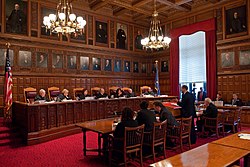A lawyer is a person who practices law. The role of a lawyer varies greatly across different legal jurisdictions. A lawyer can be classified as an advocate, attorney, barrister, canon lawyer, civil law notary, counsel, counselor, solicitor, legal executive, or public servant — with each role having different functions and privileges.[1] Working as a lawyer generally involves the practical application of abstract legal theories and knowledge to solve specific problems. Some lawyers also work primarily in advancing the interests of the law and legal profession.[2][3]
Terminology[edit]
Different legal jurisdictions have different requirements in the determination of who is recognized as being a lawyer. As a result, the meaning of the term “lawyer” may vary from place to place.
Some jurisdictions have two types of lawyers, barrister and solicitors, while others fuse the two. A barrister (also known as an advocate or counselor in some jurisdictions) is a lawyer who typically specializes in arguing before courts, particularly in higher courts. A solicitor (or attorney) is a lawyer who is trained to prepare cases and give advice on legal subjects. Depending on jurisdiction, solicitors can also represent people in lower courts but do not ordinarily have rights of audience in higher courts. Both solicitors and barristers are trained in law. However, in jurisdictions where there is a split profession, only barristers are admitted as members of a bar association.
The distinction between barristers and solicitors originated in the English legal system, but many countries which have adopted English law have eliminated the distinction. Countries such as New Zealand, Canada (with the exception of Quebec, which practices civil law), India, Pakistan, and the US have adopted a fused profession, where all lawyers have the privileges of both barristers and solicitors.[4]
Some fused-profession jurisdictions use one term to describe lawyers generally. For example, the US lawyers are typically referred to as “attorneys”,[5] while Indian and Pakistani lawyers are known as “advocates”. Other fused jurisdictions use terms such as “barrister and solicitor” or “attorney and counselor” to describe lawyers in general.
Nonetheless, the terminology of “barrister” and “solicitor” may still be applied to lawyers who deal in the specific kinds of work barristers and solicitors generally do. In countries like the US, however, the term “trial lawyer” typically describes the work of a lawyer who specialises primarily in arguing cases.
Nonetheless, in countries like England, Wales, Australia, and South Africa, the distinction between barristers and solicitors remain. Additionally, England and Wales has a number of other classifications of lawyers, which include registered foreign lawyers, patent attorneys, trademark attorneys, licensed conveyancers, public notaries, commissioners for oaths, immigration advisers and chartered legal executives. Under the English Legal Services Act 2007, “lawyer” is not a protected title. In other jurisdictions, like the United States, there are strict restrictions on who may call themselves a lawyer, with paralegals and patent agents generally disallowed.[6][7][5]
Responsibilities[edit]
In most countries, particularly civil law countries, there has been a tradition of giving many legal tasks to a variety of civil law notaries, clerks, and scriveners.[8][9] These countries do not have “lawyers” in the American sense, insofar as that term refers to a single type of general-purpose legal services provider;[10] rather, their legal professions consist of a large number of different kinds of law-trained persons, known as jurists, some of whom are advocates who are licensed to practice in the courts.[11][12][13] It is difficult to formulate accurate generalizations that cover all the countries with multiple legal professions because each country has traditionally had its own peculiar method of dividing up legal work among all its different types of legal professionals.[14]
Notably, England, the mother of the common law jurisdictions, emerged from the Middle Ages with similar complexity in its legal professions, but then evolved by the 19th century to a single division between barristers and solicitors. An equivalent division developed between advocates and procurators in some civil law countries; these two types did not always monopolize the practice of law, in that they coexisted with civil law notaries.[15][16][17]
Several countries that originally had two or more legal professions have since fused or united their professions into a single type of lawyer.[18][19][20][21] Most countries in this category are common law countries, though France, a civil law country, merged its jurists in 1990 and 1991 in response to Anglo-American competition.[22] In countries with fused professions, a lawyer is usually permitted to carry out all or nearly all the responsibilities listed below.
Oral argument in the courts[edit]

Oral arguments being made before the New York Court of Appeals.
Arguing a client’s case before a judge or jury in a court of law is the traditional province of the barrister in England and Australia,[23] and of advocates in some civil law jurisdictions.[24] However, the boundary between barristers and solicitors has evolved. In England today, the barrister monopoly covers only appellate courts, and barristers must compete directly with solicitors in many trial courts.[25] In countries like the United States, which have fused legal professions, there are trial lawyers who specialize in trying cases in court, but trial lawyers do not have a legal monopoly like barristers. In some countries, litigants have the option of arguing pro se, or on their own behalf. It is common for litigants to appear unrepresented before certain courts like small claims courts; indeed, many such courts do not allow lawyers to speak for their clients, in an effort to save money for all participants in a small case.[26] In other countries, like Venezuela, no one may appear before a judge unless represented by a lawyer.[27] The advantage of the latter regime is that lawyers are familiar with the court’s customs and procedures, and make the legal system more efficient for all involved. Unrepresented parties often damage their own credibility or slow the court down as a result of their inexperience.[28][29]

Add a Comment